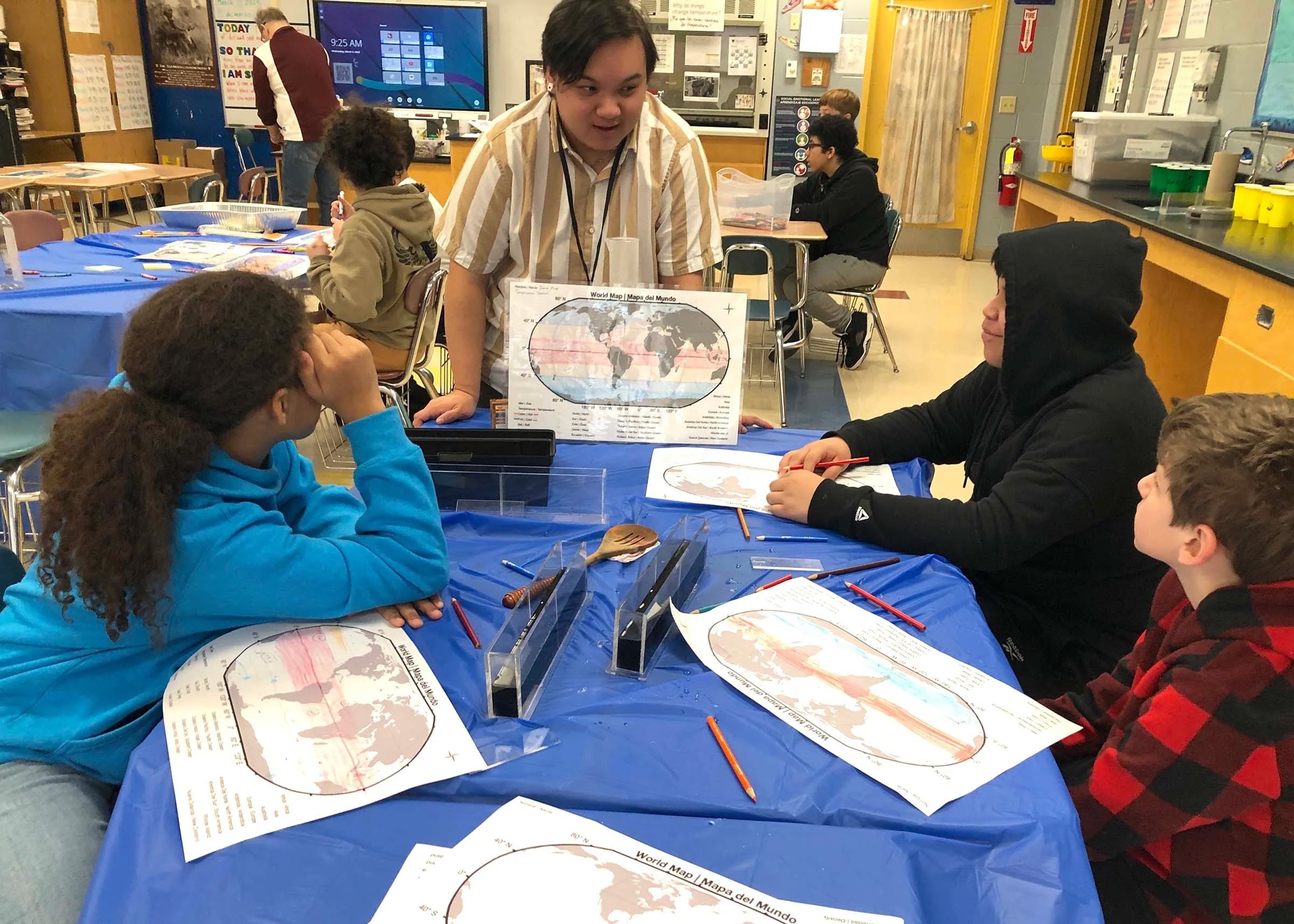URI oceanography students engage sixth graders in hands-on activities
June 5, 2025
Sixth grade science lessons at Governor Christopher DelSesto Middle School in Providence were more interactive this year thanks to a partnership with GSO.
The pilot program, in which four GSO students worked with approximately 200 students from the Providence Public School District middle school, was developed by the Rhode Island Department of Education and funded by a $10,000 STEMx Challenge Grant.

Through hands-on activities at DelSesto Middle School and a field trip to URI’s Narragansett Bay Campus, the URI students helped the sixth graders understand how lessons in their science classes had real-world applications. The middle schoolers learned about career pathways in science, technology, engineering, and mathematics (STEM).
“We were pleased to engage in this learning experience with URI,” said Nicole Elliott, a science teacher at DelSesto Middle School. “Our students realized that what they were learning in science class is relevant and important. The experience from GSO complemented our curriculum very well, and we appreciated the opportunity to participate in the planning of the in-school experience alongside the graduate students to create a lesson that was engaging and informative.”
According to student enrollment data from 2023, 92% of the students at DelSesto Middle School are from underrepresented groups in STEM and 39% are multilingual learners.
“The graduate students were incredibly receptive to our suggestions for creating support for our multilingual learners,” said Elliott. “This ensured that all students at our school were included in the discussions.”

Erin Jones, a native of Bainbridge Island, Washington, was one of the URI graduate students. She happens to live in an apartment that was located less than two miles from DelSesto Middle School.
“The school was down the street from my apartment in Providence, so I was eager to be part of a project that benefited the community,” said Jones, who expects to earn her doctorate in oceanography from URI this fall. “My experiences with elementary or middle school students have mostly been in South County, where there is much less diversity. It was deeply rewarding to put the students at ease, since I was a stranger to them. I also enjoyed keeping them engaged and seeing their excitement during the lessons.”
Jasper Meagher, a URI oceanography doctoral student from Kazakhstan, who was raised in Houston, Texas, also found the experience meaningful.
“It was important to me that the middle schoolers understood that a scientist can look like anyone and do anything,” said Meagher. “I hope the demonstrations and campus visit solidified how important the ocean is and how there is so much out there to study and learn.”
GSO students visited the middle school several times to conduct lessons on various topics related to ocean science, such as the impact of salt, uneven heating, and wind on ocean water and currents.
Besides conducting lessons, the graduate students also spoke to the sixth graders about STEM-related careers, areas of study, and scientific pursuits.
In April, the middle school students visited URI’s Bay Campus, where they toured the facilities, visited laboratories, met with professors, and walked on the beach – which was a new experience for some.
“The field trip was critical to strengthening the connection between what was discussed in the classroom with what goes on in the ocean,” said Sophia Yates, a Little Compton resident who is pursuing her master’s degree in oceanography at URI. “A highlight of the field trip for the students was the marine research aquarium, where they truly experienced hands-on learning by touching the sea stars and hermit crabs.”
The sixth graders participated in a water pressure experiment while at the Bay Campus. After decorating and writing their names on Styrofoam cups, the cups were brought aboard a research vessel, lowered deep underwater, and then brought back to the surface. The cups returned compressed due to air in the Styrofoam being forced out by the intense water pressure.
“The students were excited to see what happened to their cups,” said Samuel Ashley, science, technology, engineering, art, and math (STEAM) coordinator for DelSesto Middle School. “It was heartening to see the impression it made on the students.”
The program culminates with a presentation by Ashley and a couple of the sixth-grade teachers at a science symposium atthe Providence Public School District’s central office on June 17.
“We’re hoping this example of a partnership between one of our public schools and URI will lead to similar programs at other Providence schools,” said Ashley.

